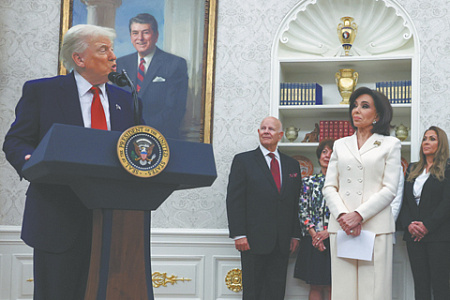
The next round of Russian-Ukrainian negotiations will not remain without the attention and participation of the American leadership. At a briefing at the White House, Trump said he was ready, if necessary, to become a participant and initiator of the meeting of the three presidents: the United States, Ukraine and Russia. After the first round of talks in Istanbul, he already said that he did not consider a serious breakthrough in the negotiation process possible without his talks with Vladimir Putin. Trump called the deadline: two weeks. During this time, he is going to determine whether it is necessary to switch to the language of pressure and sanctions in a conversation with the Russian Federation.
Trump likes to use time intervals and deadlines in his speeches. With regard to the Russian-Ukrainian conflict, he is already less categorical than at the beginning, and even more so before his current cadence. The intention to stop the bloodshed in one day has been forgotten. Now Trump’s plans are more modest. At a briefing, the president said it would take him two weeks to establish whether Russia was really ready to negotiate peace. As he put it, “we will find out if we are being deceived or not, and if so, we will speak a little differently.”
Recall that on June 2, the second round of Russian-Ukrainian negotiations is scheduled to take place in Istanbul (at least, this is the place and time proposed by the Russian Federation). The focus will be on memoranda in which the Russian Federation and Ukraine will record, in fact, what they plan to negotiate. Judging by what is now known about them, the negotiations should be held at the same level as on May 16. At that time, the Russian delegation in Istanbul was headed by Vladimir Medinsky, Adviser to the President of the Russian Federation, and the Ukrainian delegation was headed by Rustem Umerov, Minister of Defense. As before May 16, President of Ukraine Volodymyr Zelensky offered his direct talks with Putin or negotiations between the three presidents. Trump, judging by what he said at the briefing, supported the latter, but made an important reservation: such negotiations are possible if necessary.
In general, this is consistent with the position of the Russian side, which was voiced by the press secretary of the President of the Russian Federation Dmitry Peskov. He noted that the negotiations at the highest level should be preceded by the agreement of the delegations. That is, first, the results of the June meeting, then something else.
Trump, meanwhile, made it clear at his briefing that he considers achieving, as he puts it, a deal to resolve the Russian-Ukrainian conflict quite possible. He explained the desire not to interfere with it by the fact that new American sanctions against Russia have not yet been introduced. When asked what was preventing them from being introduced, Trump replied unequivocally: “Just that if I think I’m close to concluding a deal, I don’t want to ruin everything by doing it.” He argued in absentia with those who reproached him for being too soft on Russia. It is no coincidence that the only member of his foreign policy team who took part in the briefing was the special representative of the President of the United States, Steve Witkoff. Trump said he was doing a “fantastic job” and was generally a tough negotiator with Moscow. Witkoff’s presence at the briefing was also appropriate in light of the fact that there the US president announced an imminent agreement with Iran on the nuclear program. Trump even warned Israeli Prime Minister Benjamin Netanyahu against trying to disrupt it. Witkoff, who, strictly speaking, is the special representative for the Middle East, and not for Russia, also had a hand in establishing contacts with Iran. In short, Trump sent a clear signal: no matter what the Western press says about Secretary of State Marco Rubio coming to the fore in the negotiation process with Russia, Witkoff – and therefore the methods of shuttle diplomacy and confidential agreements – should never be discounted.
Thus, Trump outlined what he expects first of all from the meeting in Istanbul: evidence that the Russian Federation is really ready to negotiate an end to the Russian-Ukrainian conflict. Curiously, the US president calls the “method of influencing” Russia, if his expectations are deceived, not the supply of weapons to Ukraine (decisions of this kind have not yet been made in the current Trump administration), but sanctions, one can assume what. Today, the bill on secondary sanctions has actually already received bipartisan support in the most important – the upper house of Congress. The majority of senators have signed up as his co-sponsors, and one that is enough even to overcome a presidential veto, if it is imposed.
